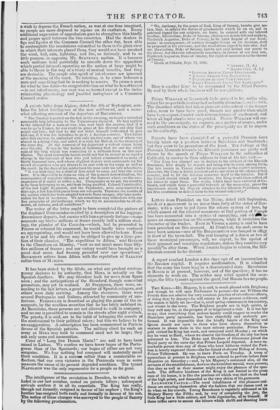A private letter from Algiers, dated the 5th of September,
con- tains the latest intelligence of the new settlenient, and a some- what affecting- account of the departure of BOURMONT.
" The Marshal departed on the 3rd. in the evening, on board a wretched mercantile brig belonging to the Commissary-General. He had applied to the Admiral for a man-of-war, who sent back the answer, that if it was to go to France, he was ready to place at his disposal any ship that might suit him ; but that he did not think himself authorized to give him one, if it was his intention to go to a foreign con ntry. Two hours after this answer, he embarked with only his two sons, one of whom was almost in a dying state, and sailed, it is said, for Mahon, in the evening of the same day. At the moment of his departure a violent storm hung over the city. It was by the flashes of lightning that we saw the white sails of the brig which was conveying to a distance from us this new Marius. The most insensible hearts could not but be moved at so rapid a change in the fortunes of him who just before commanded an army of thirty thousand men, and whose slightest desires were commands for the crowd of courtiers who are always to be met with in the camp as well as the court. In the days of his misfortune his sons were his sole attendants.
" It was high time for a chief of firm mind to come and take the reins here. It is impossible to form an idea of the general demoralization, the consequence of complete idleness, and of the diseases which are the con- sequences of it under so sultry a sky. Conquerers as we are, the country is far from belonging to us, and from being pacified. Colonel Fraicheville, of the 2nd Light Regiment, and the Paymaster, were assassinated ten days ago, a few hundred paces from our out-posts. These are the results of the system which has been adopted towards these savages, who take mode- ration for fear or weakness. We are sometimes very ridiculous with our fine principles of philanthropy, which we try to accommodate to all cli- mates, all nations, and all conditions."
The writer of the letter ought to have completed the picture of the displaced Commander-in-chief by a description of his luggage. 33ourtmoNe departs, but carries with him a princely fortnne—some accounts say twelve millions of francs (nearly half a million sterl- ing), the plunder of the Casauba—which, had he proceeded to France or retained his command, he would hardly have ventured on appropriating, and would not have been allowed to keep. Even as it is he and his officers may be obliged to give up a large por- tion of their plunder. "The expedition to Africa," said Go izor to the Chambers on Monday, "cost us not much more than fifty- five millions of francs ; and our victory would have brought us a good-deal more, had honesty presided over our operations." BOURMONT retires from Africa with the reputation of SALLUST rather than of MARIus.


























 Previous page
Previous page